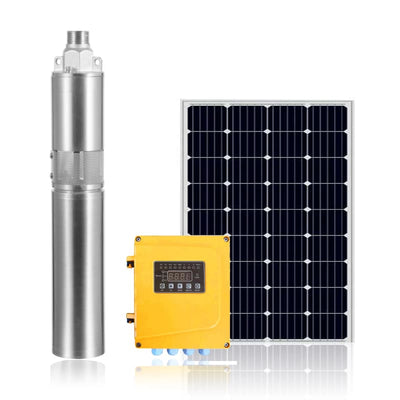
Renewable photovoltaic irrigation services offers a sustainable and cost-effective solution for aquaculture. Through harnessing daylight energy these setups pump water from multiple sources like rivers, to fulfill the needs of homesteads. Solar-powered pumps are efficient and require minimal maintenance, making them perfect for mixed on-grid off-grid deployments.
Photovoltaic water lift systems comprise of photovoltaic arrays turning sunrays into power, which then powers a pump. Numerous types of pumps are available, featuring centrifugal, submersible and reciprocating pumps, each designed for different water lifting requirements.
- Solar-powered water pumping systems minimize dependence on fossil fuels, contributing to a cleaner environment.
- Additionally, these systems deliver a steady water supply for off-grid locations with limited grid access.
- As a result, solar water pumping is becoming increasingly popular as a sustainable and viable solution for water management globally.
Harnessing Solar Energy for Irrigation
Seeking a dependable green method to sustain fields? Pond-mounted photovoltaic pumps present an inventive approach, using sunlight to transfer pond water to farm plots. They provide a greener irrigation choice, cutting fossil fuel use and shrinking environmental footprint.
Low-maintenance long-life pond pumps make a budget-friendly method to secure ongoing water supply for agricultural use. Adopt renewable power and support green goals through pond photovoltaic pumps.
Sun-powered submersible units enable dependable deep-water access in low-grid regions.
Solar-Powered Submersible Pumps
Where grid access is constrained, dependable water sources are vital for farming and daily life. Submersible pumps, traditionally fueled by electricity from the grid, can be costly to operate and maintain. Technological progress in PV systems has enabled sun-powered submersible pumps as an eco-friendlier alternative. These cutting-edge systems leverage solar panels to generate electricity, which then powers the pump to draw water from wells. The approach reduces fossil fuel dependency and grid reliance, presenting a cost-savvy way to access safe water.
Harnessing Sunlight for Water Access
Solar energy offers major potential especially for supplying vital water resources. Solar well pump installations represent a transformative option merging green power with dependable irrigation and household supply. The systems convert sunlight to operate strong pumps that lift water from deep wells, ensuring steady supply in isolated locations.
Furthermore, solar well pump systems offer numerous advantages including reduced energy costs, lower carbon footprint, and increased energy independence.|These well pump systems deliver reduced operating expenses, decreased emissions, and greater autonomy.|Among benefits are lower energy bills, reduced carbon output, and strengthened energy sovereignty.} Tapping limitless solar power helps secure clean water access while protecting the environment for future generations.
- Visualize a world where every community, regardless of its location, has access to reliable and sustainable water sources.
- Solar well pump systems make this vision a reality.
- Let's explore the profound impact of these systems on rural communities, agriculture, and the environment.
Go Green with Solar: Universal Water Supply Solutions
Water serves life and farming but obtaining it often poses obstacles. Conventional techniques typically depend on fossil fuels and add to pollution. Fortunately, there's a eco-friendly solution: solar water pumping. The system captures solar energy to transfer water with consistency and efficiency. Solar water pumps are suitable for a spectrum of applications, from supplying crops in remote areas to providing clean water in communities lacking traditional infrastructure. Zero fuel expenses well submersible pump and low upkeep make PV pumping an economical choice benefiting ecology and budgets. Let's explore the benefits of solar water pumping in more detail: * Sustainable power * Financial savings * Green solution * Dependable functionality * Noise reduction Switching to solar water pumping is a intelligent decision for a eco-friendly future.Optimizing Solar-Powered Water Systems
Maximizing PV pump efficiency takes an integrated and tactical method. Identifying the right solar panels, utilizing efficient pumps, and optimizing system design are crucial steps in this process. Leveraging daylight energy permits development of dependable sustainable pumping systems across many uses.
- Considerations influencing efficiency include panel placement, climatic conditions, and system maintenance.
- Innovative advancements in solar panels and pump technology are constantly pushing the boundaries of efficiency.
- Analytical monitoring and control systems can further enhance performance and minimize operational costs.
Sustainable Aquifer Management with Solar Well Drawers
Aquifers, the underground reservoirs of groundwater, are essential for agriculture. However, overexploitation and climate change pose a significant threat to their sustainability. Addressing risks calls for alternative sustainable tactics such as PV well pumping, which is gaining momentum. Sun-driven well pumps enable efficient groundwater extraction with lower environmental toll. By harnessing the power of the sun, these systems eliminate reliance on fossil fuels and decrease greenhouse gas emissions.
- Solar well pumps promote aquifer recharge by balancing water use.
- They provide a sustainable source of energy, ensuring supply to clean water even in remote areas.
- Moreover, solar well pumps reduce operational costs and maintenance requirements compared to traditional diesel-powered pumps.
Harnessing Solar Energy
Wells hide accessible reserves of energy that can be unlocked. Solar radiation supplies the key resource to realize that potential. Capturing the sun's rays lets us power living needs in an eco-responsible way.
- Photovoltaic systems
- Absorb
- Daylight
This renewable resource provides abundant supply that helps cut fossil fuel dependence. Adopting photovoltaic power promotes a more sustainable and responsible tomorrow.

Solar Water Pumping: A Renewable Energy Revolution
As global water scarcity intensifies, innovative solutions are rising to meet this critical challenge. Sun-powered pumping is increasingly seen as a cost-effective sustainable substitute for traditional water systems. By harnessing the energy of photovoltaic panels, solar water pumps supply clean water for irrigation, livestock, domestic use, and even small-scale hydropower generation.
Advantages of PV pumping span many areas. It lowers fossil fuel dependency, cuts emissions and supports sustainability. Additionally, PV pumps grant operational autonomy since they run without grid ties or stored fuels. This makes them particularly suitable for remote areas where access to electricity is limited or unreliable.
- Furthermore, solar water pumping systems are relatively low maintenance and have a long period with proper care, resulting in long-term cost savings.
- The technology is also adaptable to different applications, ranging from small farm plots to large-scale agricultural operations.
In conclusion, solar water pumping represents a transformative shift towards sustainable water management. Embracing sun-powered pumping aids in guaranteeing clean water, strengthening communities and conserving the planet for coming generations.
Harnessing Solar Energy for Irrigation
Enhancing crop output naturally remains a common objective among agriculturalists. Utilizing solar energy for irrigation offers an innovative and sustainable solution to this challenge. By harnessing the power of the sun, farmers can efficiently deliver water directly to their crops, reducing reliance on traditional methods that often consume vast amounts of energy. This environmentally responsible practice boosts productivity and fosters sustainability. Over time photovoltaic irrigation lowers running costs versus fuel-dependent systems.
- Advantages of using solar-powered irrigation include:
- Minimized dependence on fossil fuels.
- Enhanced crop yields and quality.
- Optimal water utilization.
- Financial benefits.
Solar-Powered Watering Systems

PV watering systems transform garden and landscape irrigation and are rising in popularity. Such systems convert sunlight into pumping energy to distribute water with ecological benefits. By capturing sunlight into electricity, solar panels fuel a pump that provides water to plants, lowering reliance on traditional energy sources.
- Furthermore, these systems are cost-effective in the long run, as they reduce monthly utility costs.
- In addition, solar-powered watering systems offer a eco-conscious solution for watering, making a difference to a more environmentally friendly future.
As the advancements in solar technology, these systems are becoming increasingly convenient, enabling homeowners and cultivators to benefit from a more productive approach to watering.
